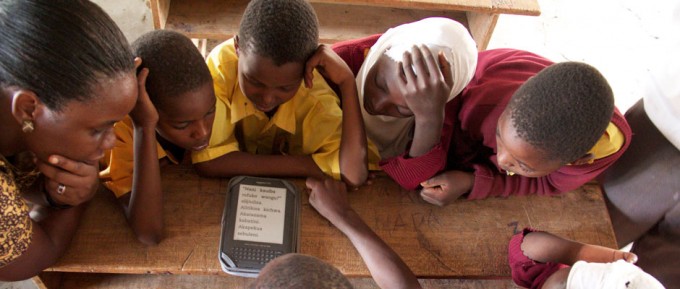- Qualcomm Launches Snapdragon 4 Gen 2 Mobile Platform
- AMD Launches Ryzen PRO 7000 Series Mobile & Desktop Platform
- Intel Launches Sleek Single-Slot Arc Pro A60 Workstation Graphics Card
- NVIDIA Announces Latest Ada Lovelace Additions: GeForce RTX 4060 Ti & RTX 4060
- Maxon Redshift With AMD Radeon GPU Rendering Support Now Available
UNESCO Study Finds Mobile Devices Vastly Unlock Literacy Potential in Developing Countries
Sometimes, while I’m mindlessly browsing the Web, it hits me: I’m bored. As far as first-world problems go, that has to be right up there as the dumbest. In developing countries, getting access to the latest meme or sports highlight isn’t the concern; getting books to read is. In a large number of these countries, libraries are not an option, and if they are, the lack of interesting content might steer people clear. Over here, we have the world at our fingertips; over there, not so much.
That’s a problem that Worldreader has been working on solving. Founded in 2010 by former Amazon and Microsoft exec David Risher, Worldreader relies on donations to help send ebooks to those who need them. This isn’t just about entertaining people, but helping them learn. Over the past two years, UNESCO, working with Worldreader and Nokia, conducted a study that has resulted in some interesting statistics.

Across the 5,000 participants of this study, 62% said that reading was a lot more enjoyable on a mobile device, and most are reading more as a result. Despite being in countries dominated with males (77%), it was found that women are reading a lot more than men – 207 minutes per month, versus 33. 1/3rd of participants read to their children off their mobile device, while a further 1/3rd said that they would if more kid-centric content was available.
Had you asked me before this study was released what I thought the biggest deterrent was in reading ebooks in developing countries was, I would have replied “cost”. Well, according to this study, a mere 13% of participants cited that as a reason. With Worldreader’s tech, data costs to the reader are low (~2 – 3 cents per 1,000 pages). 60% said that lacking content was an issue, but that seems to be something that’s improving all the time.
Perhaps one of the most striking stats to come out of this study is that 90% of participants in this study said that they intend to spend more time reading on their smartphone in the next year.
World illiteracy can be attributed in part to the fact that people have access to a very small number of books, or none at all in some areas of the world. Yet there are more cell phones on the planet than there are toilets or toothbrushes. Already kids and families have read more than 1.7 million Worldreader books – helping them attain a more prosperous, more self-reliant future.
That quote comes from Worldreader’s founder and CEO David Risher, and it’s good one. More cell phones than toilets? That one boggles the mind.




